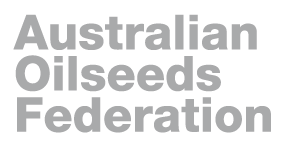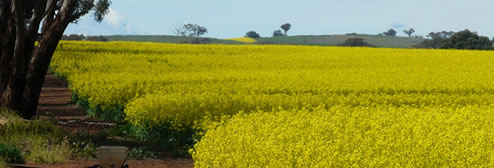Content
Oilseeds Industry
Delivering high quality products to local and global markets
History of Oilseeds in Australia.
Despite the oilseeds arriving with the First Fleet in 1888, it was not until the establishment of the first processing mill in Sydney in 1908 that the industry was truly born.Since then, the industry has grown and prospered to become one of the more significant agri-buisness sectors in Australia, supplying high quality products to the food, feed and fuel sectors.
To commemorate the first century of the industry, the AOF commissioned the publication of '1908-2008- 100 Years of Oilseeds in Australia', a limited edition publication available through this link. Hard copies are also available by contacting the AOF.
Strong demand for Australian oilseeds
Both at home and overseas, there is a high demand for Australian oilseeds, oil, meal and other value-added products. Supported by an efficient chain of production, processing, distribution and marketing, the industry produces around three million tonnes of oilseeds annually. Canola and cottonseed – Australia’s major oilseed crops – account for over 90% of local production. We also produce other oilseeds such as soy, sunflower, safflower, peanut and linseed/linola – Australia’s oilseed industry is dynamic, complex and diverse. Our oilseed exports are significant – we supply over one million tonnes of canola seed (15-20% of the world’s canola trade) to Japan, Europe, China, Pakistan and other international markets annually. We also export cottonseed to Japan, Korea, the USA and other markets, along with oils to Japan, Korea, New Zealand, throughout the Pacific and to parts of Asia. Australia is also becoming well known as a supplier of high quality edible oilseeds, such as soybeans and confectionary sunflower.
Australian oils and oilseeds have gained an excellent reputation with international buyers based on our efficient chain of production, processing and distribution. Their unique characteristics are particularly appealing to the food industry looking for products that meet the growing demand for healthy oils in cooking and dining, such as mono sun, canola, mid/high oleic canola, poly sun, cottonseed, and blends.
Good health from Australian oils
Preferred by the health conscious, home cooks and food industries alike, Australian oils offer a healthy nutritional profile, and are great tasting and versatile. Australia uses over 600,000 tonnes of oils and fats annually with the vast majority utilised in edible applications. Our consumption of oils shows a growing preference for healthier products, with an increasing demand for canola and high oleic oils. Soft (or seed) oils are strengthening their share of the total fats and oils market, and now account for over half of all usage. Canola is the most sought-after soft oil, and represents approximately 45% of our total soft oils usage. Small quantities of dietary fat (or fatty acids) are essential for good health, and dieticians recommend we include unsaturated dietary fats in our diet, and avoid foods with high levels of saturated fats and trans fatty acids. Saturated fats have been linked to coronary heart disease and can raise the levels of the harmful LDL-blood cholesterol. In contrast, polyunsaturated fats, containing higher amounts of omega-3 fatty acids, and monounsaturated fats, containing omega-6 fatty acids, can help reduce harmful LDL-cholesterol levels (as a direct replacement for saturated fats in the diet). Soft oils are a healthy source of omega-3 linoleic acid (LA) and omega-6 alpha linoleic acid (ALA). These two essential fatty acids must be included in our diet, as they cannot be made in the body. Not only is the amount of fat in the diet important for good health, but the type of fat consumed can also make a significant difference to our health.
Quality oilseeds – our commitment to you
Close working relationships between research, government and our industry have delivered impressive results for the quality of Australian oilseeds. Australia’s unique environment, high quality breeding programs and innovation in farming techniques all combine to produce exceptionally high quality canola. In the international market, Australian canola is in strong demand, recognised for its characteristics of quality and reliability. The Australian oilseed industry is committed to producing the highest quality oilseed products, giving a leading advantage to sellers and buyers.
Our oilseed industry supplies the components, both here and overseas, for many items in daily use, including:
- Cooking oil
- Spreads and shortening
- Prepared foods
- Meal for dairy, poultry and other livestock
- Cosmetics
- Lubricants, fuels and other industrial applications
Our canola crop quality has benefited from industry partnerships and selective breeding programs. Our storage facilities are of the highest standard – we serve our health conscious buyers and consumers by delivering high quality, clean, contaminant free product.
Australian canola oil content has been steadily improving due to our selection of:
- Higher oil and protein content varieties
- Varieties that mature earlier to benefit from winter rainfall and avoid the hot, dry summer periods during seed development.
Australian canola meets the global standards for oil content and is widely recognised for its low levels of moisture, admixture and chlorophyll, all of which assure a major advantage for buyers and processors of Australian canola.
Canola – the Australian oilseed in greatest demand
As the world’s second largest exporter of canola seed, Australia’s exports consistently exceed one million tonnes. Our canola crop has grown to a size and quality that meets the high expectations of exporters, domestic crushers and intensive livestock producers.
From a minor crop in the late 1980s, canola is now Australia’s third largest broad-acre crop (after wheat and barley) – canola is widely grown across south-east Australia and in western Australia. Australian growers have adapted to their unique climate and growing conditions, which vary over large areas.
In 1990, Australia hit the global stage as an exporter of canola seed, and rapid growth led to our exports exceeding two million tonnes in 1999/2000. Our annual exports have now stabilised at around 1 to 1.5 million tonnes, and our main export markets are Japan, China, Pakistan, Europe and Bangladesh.
The Australian canola industry abounds with opportunity. Increasingly, we are moving towards higher value-added domestically-produced oils and greater production. As well, the industry continues to develop improved oilseed varieties.
Our research and development will be driven by consumers’ greater nutritional awareness, desire to replace unhealthy fats with healthier soft oils and the strengthening domestic demand for canola meal.
New uses of canola, such as bio-diesel, will also provide opportunities for the canola industry to grow and excel.
Canola meal is a high quality protein meal suitable for most livestock diets. The livestock sector, and its consequent usage of feedstuffs, is growing rapidly, with higher demand for oilseed meals. Currently, a large share of this is met by imported soymeal but as we have increased our production of canola and cottonseed, domestically-produced meals have also been in greater use. Canola meal represents around one quarter of the total meal market in Australia, and is mainly used in pig, poultry and dairy rations.
Australia’s supply chain
The future is bright for Australia’s soft oil industry. From informed markets that distinguish between ‘good and bad fats’ to stock feed and industrial uses, Australia’s diverse and sophisticated oilseed industry delivers a crop for many market sectors.
In recent years, our improved productivity, oilseed quality, product mix and efficiency in our supply chain have all led to accelerating growth in Australia’s oilseed production and exports.
Today the industry is valued at over $2.5 billion, and Australia’s reputation for producing high quality, safe food has helped us respond successfully to increasingly competitive domestic and global markets. Australia’s oilseed industry is diverse and extensive, ranging from family farm producers to large multinationals. We have been consolidating and internationalising our processes, with local and international companies now involved at all levels, from breeding and seed development to trading, processing and marketing.
Geographically and strategically, Australia is well placed to continue supplying the rapidly expanding export markets of Asia. Our production areas are close to major ports, and this, combined with our mild winters means we can efficiently deliver quality product all year round.
As well, an agreed set of Australian standards for oilseed industry products ensures certainty to buyers of Australian seed, oil and meal, and is just one more component in our export success.
The Australian oilseed industry – leading through innovation
Future prospects for the Australian oilseeds industry are excellent. We have a strong customer focus, and have developed our Strategic Plan 2010 to ensure that we meet the needs of our local and international food and non-food customers.
The Australian oilseed industry will continue to be a leading supplier of high quality soft oils and meal products, and will expand its share in food markets with excellent edible products such as soybeans and confectionary sunflower.
As an industry, we are widely recognised for our innovation, and will continue to develop new and enhanced oils for health and functionality, and as ingredients for functional foods.
Another key opportunity for the industry is in industrial oils, particularly biodiesel, and other applications.
We remain focused on building and delivering a larger industry, in terms of value and volume. This, in turn, will lead to:
- Increased investment in grower capabilities
- Improved oilseed varieties (both in quality and yield)
- Developing market support activities and new technologies.
The Australian Oilseeds Federation (AOF) – working together to enhance opportunities for our industry
Over the past 30 years, the Australian oilseeds industry has grown into a major national agribusiness, with a high value-added component. The Australian Oilseeds Federation is the peak industry body for the Australian oilseeds value chain, in both the domestic and global arenas embracing consumers of food, feed, health and industrial products.
The AOF plays a key role in its industry’s success. Our strategic plan – The Australian Oilseeds Industry Strategic Plan 2010 – is our plan for the next era of growth and development. Through improved productivity and quality, product-mix and supply-chain efficiency, the Australian oilseeds industry has the potential to grow from its current value of $2.5 billion to $3.3 billion by 2010.
The AOF is committed to creating a more cohesive industry by:
- Improving our industry’s capacity and influence
- Assisting and encouraging innovation in market and product development
- Developing our growers’ capability.
Since its inception in 1970, the AOF has worked with its members to realise our industry’s outstanding potential.

